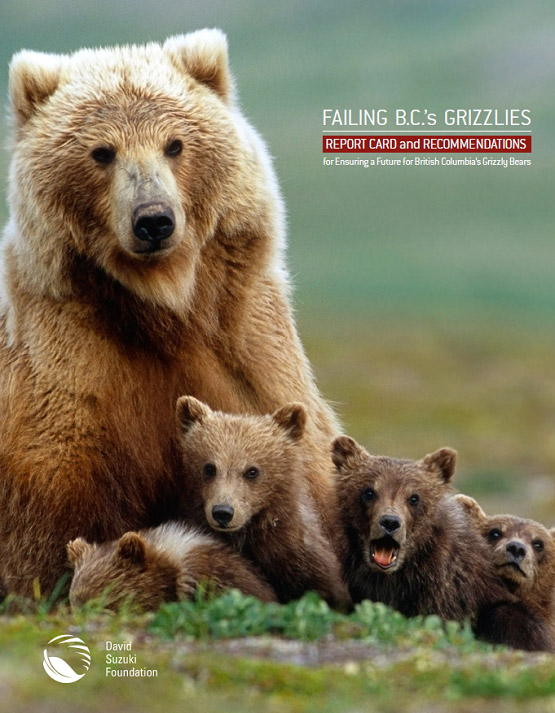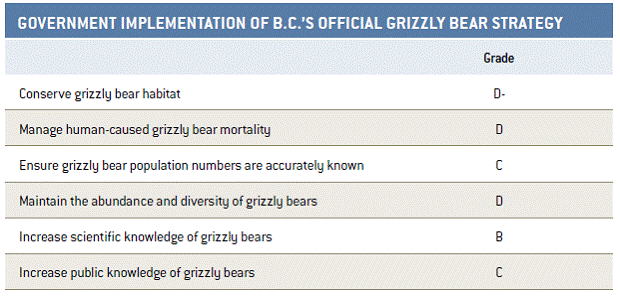|
| |
| 17. März 2014 |
Schlechtes Zeugnis für die Provinzregierung von BC: Umsetzung
einer Schutzstrategie für Grizzlybären ist größtenteils mangelhaft |
| |
| Die David Suzuki Foundation stellt der Provinzregierung von BC für Ihre Umsetzung einer Schutzstrategie für Grizzlybären ein äußerst schlechtes Zeugnis aus. Bereits 1995 wurde vom damaligen Ministry of Environment, Lands and Parks die Grizzly Bear Conservation Strategy erstellt. Darin heißt es: „The mandate of the strategy is to ensure the continued existence of Grizzly Bears and their habitats for future generations.“ In der Schutzstrategie wurden vier Ziele formuliert: |
- „To maintain in perpetuity the diversity and abundance of Grizzly Bears and the ecosystems on which they depend throughout British Columbia.
- To improve the management of Grizzly Bears and their interactions with humans.
- To increase public knowledge and involvement in the Grizzly Bear management.
- To increase international cooperation in management and research of Grizzly Bears.“
|
Die aktuelle Studie von Jeff Gailus vom März 2014 für die David Suzuki Foundation mit dem Titel „Failing B.C.’s Grizzlies: Report Card and Recommendations for Ensuring a Future for British Columbia’s Grizzly Bears“ untersucht, inwieweit die Provinzregierung die selbst formulierten Ziele der Schutzstrategie nach 19 Jahren erreicht hat. In der Studie werden Schulnoten verteilt für das Erreichen oder Nicht-Erreichen der Schutzziele und das Zeugnis für die Provinzregierung von BC fällt geradezu vernichtend aus. Trotz aller Lippenbekenntnisse, sich für die Erhaltung der Population der Grizzlybären einzusetzen, arbeitet die Provinzregierung nicht wirklich daran, die Ziele der Schutzstrategie zu erreichen. Im Gegenteil, durch fast zwei Jahrzehnte Tatenlosigkeit sind die Grizzlybären in weiteren Gebieten von BC zwischenzeitlich verschwunden bzw. ausgerottet. Die Grizzly Bear Conservation Strategy von 1995 ist das Papier nicht wert, auf das sie einst gedruckt wurde. Sie ist – was selbst das Ministerium einräumt – zwischenzeitlich veraltet und schlimmer noch, es gibt immer mehr Bestrebungen, Schutzgebiete für Grizzlybären für Pipeline- und andere Industrieprojekte zu opfern. Schutzgebietsgrenzen können schon bald beliebig verschoben werden, um Industrieprojekte auch in kritischen Lebensräumen für Grizzlybären zu realisieren. Die Studie, an der auch der Bärbiologe Wayne McCrory sowie Kyle Artelle und Chris Darimont von der Raincoast Conservation Foundation mitgearbeitet haben, ist online verfügbar unter:
www.davidsuzuki.org/publications/downloads/2014/DSF_grizzly_2014.pdf |
| |
 |
| © David Suzuki Foundation; cover photo courtesy Szecska/Flickr |
| |
| In der Zusammenfassung der Studie heißt es: „Has the British Columbia government made good on the commitment it made 19 years ago to protect B.C.’s grizzly bears from the myriad threats they face, promises that have been reiterated many times since? The answer is a resounding no. |
| By almost every measure, the B.C. government deserves failing grades for its implementation of the 1995 British Columbia Grizzly Bear Strategy. Although progress has been made on increasing scientific knowledge about grizzly bears (Grade: B), developing accurate population estimates (Grade: C), and increasing public knowledge of grizzly bears (Grade: C), very little has been done on the ground to protect B.C.’s grizzly bear population units from further decline and recover B.C.’s nine threatened population units to viable status. The 1995 British Columbia Grizzly Bear Strategy identified protecting grizzly bear habitat as the most important factor in ensuring a healthy future for B.C.’s grizzly bears, but the government has not even begun to designate the network of Grizzly Bear Management Areas (GBMA) proposed in the strategy (Grade: D-). Likewise, little has been done to reduce human-caused grizzly bear mortality over the last 19 years (Grade: D). In fact, recent research indicates that the government’s attempt to manage grizzly bear mortality below sustainable thresholds while allowing a grizzly bear sport hunt has been ineffective, and grizzly bear mortalities have exceeded government thresholds in several grizzly bear population units, sometimes for several years in a row. As a result, the government’s goal of maintaining the abundance and diversity of grizzly bears (Grade: D) is failing. Although British Columbia still boasts approximately 15,000 grizzly bears, scientific research indicates that abundance and diversity (including genetic diversity) appears to have declined since 1995. Better population estimates indicate that several populations units may have shrunk, and there is direct evidence that some population units in southern B.C. have declined. While grizzly bear recovery efforts have been successful in some parts of the United States, not a single recovery plan has been implemented for B.C.’s nine threatened population units, two of which have been found to be functionally extinct. B.C.’s Ministry of Environment has admitted that the 1995 Grizzly Bear Conservation Strategy is now out-of-date. It’s time to update and improve it, and to recommit to its implementation. This includes developing and implementing recovery plans for B.C.’s threatened population units, beginning a process to identify and designate a network of Grizzly Bear Management Areas, reducing excessive grizzly bear mortality from hunting and bear-human conflicts, and committing the long-term funding that is necessary to implement a new and improved Grizzly Bear Conservation Strategy. Without it, grizzly bears across the province will continue to be at risk of further decline, and several of B.C.’s more threatened population units will disappear entirely.“ |
| |
 |
| Die Bewertung, ob die Provinzregierung die selbst formulierten Schutzziele erreicht hat. Die Note D- entspricht im deutschen Schulsystem der Note 4,5 oder schlechter (durchgefallen). Die Note D entspricht der Note 4 (ausreichend). Die Note C entspricht der Note 3 (befriedigend), die Note B entspricht etwa der Note 2 (gut). |
© David Suzuki Foundation, Failing B.C.’s Grizzlies: Report Card and Recommendations for Ensuring a Future for British Columbia’s Grizzly Bears |
|
| |
| Faisal Moola, Direktor der David Suzuki Foundation, schrieb in seinem Artikel „B.C. government gets failing grades in grizzly bear management“ vom 5. März 2014: |
| „A century ago, 35,000 grizzly bears lived in British Columbia and also flourished from Alaska to Mexico, and east to Ontario. Today, only about 15,000 grizzly bears inhabit B.C., having disappeared from the Lower Mainland, the Okanagan and around Fort St. John. |
| Despite being large and ferocious, grizzlies are highly sensitive to human impacts such as loss and fragmentation of their forest and mountain habitats by clearcuts, roads, oil and gas pipelines and other industrial infrastructure. Female bears reproduce later in life and often produce only a small number of cubs that survive into adulthood. Grizzlies travel long distances to find food, putting them at risk of coming into contact with hunters, roads, towns and other human encroachments into their habitat. |
| Bear experts have long known that if we want to keep grizzlies on the landscape, we must protect their habitat and ensure that the animals are not needlessly killed by humans. These two strategies are at the core of British Columbia’s official policy, the Grizzly Bear Strategy, which has guided management practices in the province since 1995. The ambitious strategy outlines steps to sustain the province’s bears with healthy populations and recover those with declining populations. It requires the government to protect bear habitat in a network of ‚grizzly bear management areas‘ where resource development is prevented and/or strictly managed, hunting is prohibited and risk-related recreational activities – such as off-highway vehicle use – are controlled. The plan also recognizes that human-caused mortality must be reduced and kept below sustainable thresholds by conservatively managing the grizzly bear sport hunt … The B.C. government’s failure to manage grizzly bears effectively under its own policies is having disastrous consequences for the health of the species. Nine sub-populations are now on the verge of extinction, and scientists maintain that the government’s controversial trophy hunt is leading to widespread overkilling of bears. |
| Despite these alarming findings, government leaders continue to claim that the species is well-managed. This is a tired refrain we’ve heard before with government sanctioned overharvesting responsible for the cod collapse off the East Coast. Other species, such as woodland caribou in the north, have lost habitat to industrial development. By the time government took action, both species were well on their way to disappearing in some areas. |
| Today’s study is a wake-up call for the B.C. government to adopt a precautionary approach to managing bear populations. The good news is that in places such as the U.S., where plans protected and managed the species, grizzly populations have become self-sustaining in places where only a few decades ago they had been written off …“ |
| |
| Unter http://action2.davidsuzuki.org/protect-grizzly-bears können Sie eine Petition an Peter Kent, den kanadischen Umweltminister, unterzeichnen, in welcher er zum Schutz der Grizzlybären in Kanada unter dem Species at Risk Act (SARA) aufgefordert wird (Demand legal protection for Canada’s Grizzly Bears. We need strong legal protection for Grizzly Bears, and we need it before it’s too late). Bereits jetzt haben über 4.200 Menschen diese Petition unterzeichnet. |
| |
 zurück zurück |
|
|

